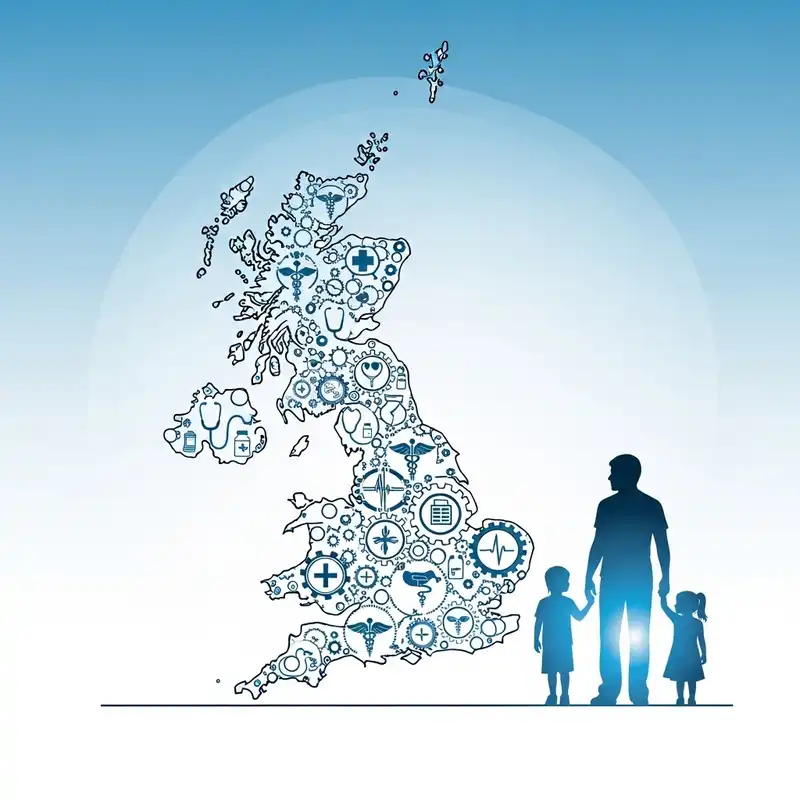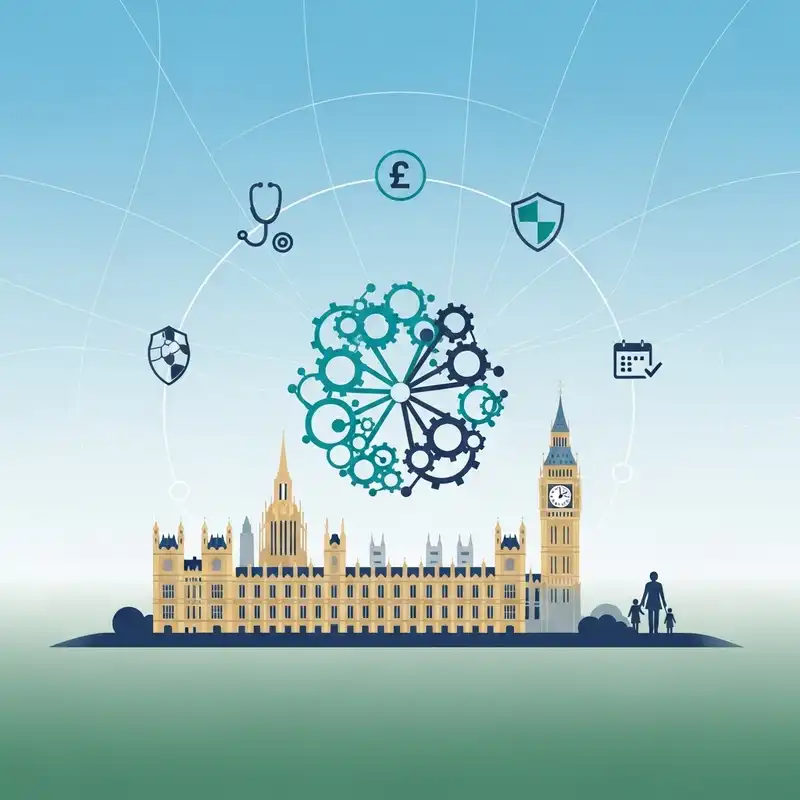TL;DR
The 2025 Anti-Fragile Blueprint: How Mastering Life's Unpredictability Through Strategic Health and Income Protection Unlocks Unprecedented Personal Growth and Family Well-being In an increasingly unpredictable world, the old advice to simply be 'resilient' feels outdated. Resilience is about bouncing back to where you were before a setback. But what if you could not only withstand life's shocks but actually emerge from them stronger, more capable, and more ambitious than before?
Key takeaways
- Fragile: Breaks under pressure. Think of a career path that depends entirely on one skill, or finances that crumble with the first unexpected bill.
- Resilient: Withstands pressure and returns to its original state. This is commendable, but it implies a period of recovery just to get back to the starting line.
- Anti-Fragile: Gets stronger from pressure. A health scare prompts you to adopt a lifestyle that makes you fitter than ever. A period of reduced income forces you to develop new, valuable skills.
- Focus 100% on recovery if you fall ill.
- Maintain your family's lifestyle without draining savings.
The 2025 Anti-Fragile Blueprint: How Mastering Life's Unpredictability Through Strategic Health and Income Protection Unlocks Unprecedented Personal Growth and Family Well-being
In an increasingly unpredictable world, the old advice to simply be 'resilient' feels outdated. Resilience is about bouncing back to where you were before a setback. But what if you could not only withstand life's shocks but actually emerge from them stronger, more capable, and more ambitious than before?
This is the essence of being anti-fragile.
Coined by the essayist Nassim Nicholas Taleb, anti-fragility describes systems that gain from disorder. While a fragile teacup shatters under stress, and a resilient rubber ball returns to its original shape, an anti-fragile system evolves and improves. Imagine your immune system: exposed to a pathogen, it doesn't just recover; it learns, adapts, and becomes more robust.
This article is your blueprint for applying this powerful concept to your own life. We will explore how a dual strategy of proactive health management and a robust financial safety net can transform you from someone who fears uncertainty into someone who thrives on it. By removing the paralysing fear of 'what if?', you unlock the mental and financial freedom to pursue personal growth, take calculated risks, and build a truly secure future for yourself and your loved ones.
What Does It Mean to Be 'Anti-Fragile' in 2025?
Being anti-fragile in 2025 isn't about building an impenetrable fortress and hiding from the world. It's the exact opposite. It's about having the confidence to live fully, knowing you have the structures in place to handle whatever comes your way.
Beyond Resilience
Let's clarify the distinction:
- Fragile: Breaks under pressure. Think of a career path that depends entirely on one skill, or finances that crumble with the first unexpected bill.
- Resilient: Withstands pressure and returns to its original state. This is commendable, but it implies a period of recovery just to get back to the starting line.
- Anti-Fragile: Gets stronger from pressure. A health scare prompts you to adopt a lifestyle that makes you fitter than ever. A period of reduced income forces you to develop new, valuable skills.
The Modern Stressors
The pressures we face are multifaceted. The UK's economic landscape is in constant flux, the cost of living remains a significant concern for most households, and the nature of work is changing, with a growing number of freelancers and self-employed professionals. According to the Office for National Statistics (ONS), long-term sickness has been a major driver of economic inactivity, with a record 2.8 million people out of work due to ill health in late 2023.
These aren't just statistics; they represent real-life shocks that can derail the ambitions of even the most determined individuals. The anti-fragile approach is not to ignore these realities but to prepare for them strategically.
An anti-fragile mindset shifts your perspective from fear of the downside to preparation for the upside. When the financial and health foundations are secure, your mind is free to focus on opportunity, innovation, and growth.
The Foundation of Anti-Fragility: Your Health and Wellness
You cannot build an anti-fragile life on a fragile foundation. Your physical and mental health is the ultimate asset, the engine that powers your career, your relationships, and your personal growth. Neglecting it is like building a skyscraper on sand.
A proactive approach to well-being doesn't just reduce your risk of illness; it enhances your energy, sharpens your focus, and builds the very resilience that allows you to handle stress more effectively. Let's break it down into four core pillars.
1. Nutrition: Fuelling Your Body and Mind
What you eat directly impacts your energy levels, cognitive function, and long-term health. A diet high in processed foods, sugar, and unhealthy fats can lead to inflammation, fatigue, and an increased risk of chronic diseases. Conversely, a balanced diet rich in whole foods provides the fuel for optimal performance.
At WeCovr, we believe so strongly in the power of proactive health that we provide our clients with complimentary access to our AI-powered calorie and nutrition tracking app, CalorieHero. This tool helps you understand your eating habits and make informed choices, putting you in control of your nutritional well-being. It's a small part of our commitment to helping you build a healthier, more robust life.
2. Exercise: Moving for Strength and Clarity
The NHS recommends that adults aged 19 to 64 should do at least 150 minutes of moderate-intensity activity or 75 minutes of vigorous-intensity activity a week. Yet, government data shows that a significant portion of the UK population doesn't meet these guidelines.
Exercise is not just about physical fitness; it's a powerful tool for mental anti-fragility. It releases endorphins, reduces stress hormones like cortisol, and improves sleep quality. Whether it's a brisk walk, a gym session, a team sport, or yoga, consistent movement builds a body and mind better equipped to handle pressure.
3. Sleep: The Underrated Performance Enhancer
In our "always-on" culture, sleep is often the first thing to be sacrificed. This is a critical mistake. According to The Sleep Charity, a staggering 40% of adults in the UK experience sleep issues.
Chronic sleep deprivation impairs judgment, reduces emotional regulation, weakens the immune system, and significantly increases the risk of serious health problems. Prioritising 7-9 hours of quality sleep per night is one of the most effective things you can do to become more anti-fragile. It's during sleep that your body repairs itself and your brain consolidates memories and processes information.
4. Mental Health: Training Your Inner Resilience
Your mental well-being is inseparable from your physical health. Practices like mindfulness, meditation, and maintaining strong social connections are not 'soft' skills; they are essential training for your mind. They help you manage stress, navigate emotional challenges, and maintain perspective during difficult times.
Data from the Mental Health Foundation highlights the prevalence of stress and anxiety in the UK. Building mental fitness is a core component of the anti-fragile blueprint, allowing you to respond to setbacks with clarity rather than panic.
| Pillar of Well-being | Key Actions | Anti-Fragile Benefit |
|---|---|---|
| Nutrition | Balanced, whole-food diet. Monitor intake. | Sustained energy, improved focus, reduced disease risk. |
| Exercise | 150 mins moderate activity/week. Mix cardio & strength. | Enhanced mood, stress reduction, physical robustness. |
| Sleep | Consistent 7-9 hours per night. Good sleep hygiene. | Better decision-making, emotional regulation, physical repair. |
| Mental Health | Mindfulness, social connection, stress management. | Increased emotional capacity, clarity under pressure. |
Building Your Financial Fortress: The Role of Protection Insurance
While personal well-being is your first line of defence, a robust financial safety net is the critical backstop that makes true anti-fragility possible. It's the structure that catches you, ensuring a shock doesn't become a catastrophe.
Protection insurance – encompassing policies like Income Protection, Critical Illness Cover, and Life Insurance – is often misunderstood as a mere expense. In the anti-fragile framework, it is a strategic investment in peace of mind and stability.
By transferring the risk of a catastrophic financial loss from your family to an insurer, you eliminate the single biggest source of stress that accompanies a major life shock. This frees you up to:
- Focus 100% on recovery if you fall ill.
- Maintain your family's lifestyle without draining savings.
- Protect your long-term goals like retirement savings and your children's education.
- Make career and business decisions based on opportunity, not fear.
Let's delve into the key components of this financial fortress.
A Deep Dive into Income Protection: Your Monthly Paycheque's Bodyguard
For most people, their ability to earn an income is their single greatest financial asset. It pays the mortgage, puts food on the table, and funds their future. Yet, it's often the most unprotected asset.
What is Income Protection (IP)?
In simple terms, Income Protection insurance is a policy that pays you a regular, tax-free monthly income if you are unable to work due to any illness or injury. It's designed to replace a significant portion of your lost earnings, typically 50-70% of your gross salary, and can pay out until you recover, retire, or the policy term ends.
Who needs it?
If you rely on your income to live, you should seriously consider it. This is especially true for:
- The Self-Employed and Freelancers: You have no employer sick pay to fall back on. One illness can wipe out your business and personal finances.
- Company Directors: While your business might support you for a while, a long-term absence can put a severe strain on company resources.
- Anyone with limited employer sick pay: Many company schemes only offer full pay for a few weeks or months. ONS data on sickness absence shows millions of working days are lost to illness each year; a short-term policy may not be enough.
Key Features to Understand:
-
Deferment Period: This is the waiting period between when you stop working and when the policy starts paying out. It can range from 4 weeks to 52 weeks. The longer the deferment period you choose, the lower your monthly premium will be. You can align it with your employer's sick pay scheme or your personal savings.
-
Definition of Incapacity: This is arguably the most important part of any IP policy.
- Own Occupation: The gold standard. The policy will pay out if you are unable to do your specific job. A surgeon with a hand tremor could claim, even if they could still work in an administrative role.
- Suited Occupation: The policy pays out if you can't do your own job or any other job you are suited to based on your skills and experience.
- Any Occupation: The most restrictive. It will only pay out if you are unable to do any kind of work at all.
For true anti-fragile protection, an 'Own Occupation' definition is almost always preferable.
Real-Life Example: Sarah the Graphic Designer
Sarah, a 35-year-old freelance graphic designer, develops a severe repetitive strain injury (RSI) in her wrist and is told by her doctor she cannot use a computer for at least six months. Her income drops to zero overnight.
- Without IP: Sarah burns through her savings in two months. She starts taking on debt to cover her rent and bills. The stress worsens her condition and delays her recovery. She fears losing her clients and her business.
- With IP (illustrative): After her 8-week deferment period, Sarah's Income Protection policy starts paying her £2,500 a month. This covers her essential outgoings. The financial pressure is gone. She can focus fully on her physiotherapy and recovery. She even uses the time to take an online course in project management, adding a new skill to her portfolio. The shock made her stronger.
| Deferment Period | Illustrative Monthly Premium | Best For... |
|---|---|---|
| 4 Weeks | £££ | Self-employed with minimal savings. |
| 13 Weeks | ££ | Aligning with standard statutory or limited company sick pay. |
| 26 Weeks | £ | Those with generous employer sick pay or significant savings. |
Critical Illness Cover: A Financial Shield for Serious Health Shocks
While Income Protection shields your monthly income, Critical Illness Cover (CIC) is designed to deal with the immediate and significant financial impact of a serious diagnosis.
What is Critical Illness Cover?
CIC pays out a one-off, tax-free lump sum if you are diagnosed with one of a list of specific serious medical conditions defined in the policy. This money is yours to use however you see fit.
Common uses include:
- Paying off a mortgage or other debts.
- Adapting your home (e.g., wheelchair access).
- Funding private medical treatment or specialist care.
- Replacing a partner's income so they can take time off to care for you.
- Simply providing a financial cushion to remove all money worries during recovery.
How is it Different from Income Protection?
Think of it this way:
- Income Protection is for a loss of income due to any illness or injury that stops you working.
- Critical Illness Cover is for the impact of a diagnosis of a specific serious condition, regardless of whether you can work or not.
The two policies work together brilliantly to create a comprehensive safety net.
The Reality of Critical Illness in the UK
The need for this cover is stark. According to Cancer Research UK, someone in the UK is diagnosed with cancer every two minutes. The British Heart Foundation reports that there are more than 100,000 hospital admissions each year due to heart attacks.
These events are not just health crises; they are financial crises. A CIC payout provides the resources to navigate the shock without derailing your family's financial future. This allows you to focus solely on what matters most: your health. The Association of British Insurers (ABI) statistics consistently show that the vast majority of claims are paid, with over 91% of critical illness claims being successful.
| Common Covered Conditions | Purpose of Payout | Anti-Fragile Benefit |
|---|---|---|
| Cancer (specific types) | Clear mortgage, cover treatment costs | Removes housing debt, allows focus on recovery |
| Heart Attack | Fund lifestyle changes, replace partner's income | Reduces financial stress on the entire family |
| Stroke | Pay for home adaptations, specialist therapy | Enables best possible recovery environment |
Life Insurance: The Ultimate Legacy of Protection
Life Insurance is the foundational layer of protection for anyone with dependents. It answers the most difficult question: "What would happen to my loved ones if I were no longer here?"
An anti-fragile plan for your family means ensuring their world doesn't fall apart financially if you pass away. Life insurance provides a lump sum or a regular income to your beneficiaries, allowing them to maintain their standard of living, stay in the family home, and pursue their future goals.
Types of Life Insurance:
-
Level Term Assurance: You choose a lump sum amount (the 'sum assured') and a policy term (e.g., 25 years). If you die within the term, your beneficiaries receive the full, fixed amount. This is ideal for covering an interest-only mortgage or providing a lump sum for your family to invest.
-
Decreasing Term Assurance: The sum assured reduces over the policy term, typically in line with a repayment mortgage. As you pay off your mortgage, the amount of cover needed decreases. This makes it a very cost-effective way to ensure your family's biggest debt is cleared.
-
Family Income Benefit: Instead of a single large lump sum, this policy pays out a regular, tax-free monthly or annual income to your family for the remainder of the policy term. For many families, this can be easier to manage than a large payout, providing a direct replacement for your lost salary.
A Niche Solution: Gift Inter Vivos Insurance
For those concerned with estate planning, a Gift Inter Vivos policy is a specialised form of life insurance. If you gift a large sum of money or an asset (like a property) to someone, it may still be considered part of your estate for Inheritance Tax (IHT) purposes if you die within seven years. This policy is designed to pay out a sum to cover that potential IHT bill, ensuring your beneficiaries receive the full value of your gift.
Specialised Protection for Business Leaders and the Self-Employed
The anti-fragile principles are perhaps most critical for those who run their own businesses or work for themselves. Your personal and business finances are often intertwined, and you lack the safety nets of traditional employment. Fortunately, there are specialised insurance products designed for you.
Executive Income Protection
This is Income Protection for company directors, but it's paid for by the business as a legitimate business expense. This is highly tax-efficient. The policy benefits are paid to the company, which then distributes them to the director through the payroll system. It protects both the director's income and the company's cash flow.
Key Person Insurance
What would be the financial impact on your business if a key director or employee died or became critically ill? Could you cover the loss of profits, recruit a replacement, or repay a business loan? Key Person Insurance is a policy taken out by the business on the life of a crucial individual. The payout goes directly to the business to help it survive the shock.
Relevant Life Cover
This is a tax-efficient way for a limited company to provide a 'death-in-service' benefit for an employee or director. The premiums are typically an allowable business expense, and the benefits are paid tax-free to the individual's family, outside of their pension lifetime allowance. It's an excellent and highly valued employee benefit for small businesses.
| Protection Type | Who It's For | How It Works | Key Benefit |
|---|---|---|---|
| Personal IP | Anyone with an income | You pay premiums personally. Payout is a tax-free income to you. | Protects your personal lifestyle. |
| Executive IP | Company Directors | The business pays the premiums. Payout is to the business to then pay you. | Highly tax-efficient for the director and business. |
| Key Person | Businesses | The business insures a key employee. Payout goes to the business. | Protects business continuity and profitability. |
| Relevant Life | Directors/Employees | The business pays. Payout goes to the individual's family. | Tax-efficient life cover outside of the estate. |
The WeCovr Advantage: Building Your Anti-Fragile Plan with Expert Guidance
Navigating the world of protection insurance can be complex. With dozens of providers and hundreds of policy variations, each with its own specific definitions and exclusions, trying to go it alone can be a false economy. Choosing the wrong policy could be as bad as having no policy at all.
This is where an expert, independent broker makes all the difference. At WeCovr, we don't just sell insurance; we partner with you to build your personal anti-fragile blueprint.
Our process involves:
- Understanding You: We take the time to learn about your life, your family, your career, and your goals. What are you trying to protect? What does your ideal future look like?
- Market Analysis: We use our expertise and technology to search the entire UK market, comparing policies from all the leading insurers. We look beyond the headline price to scrutinise the crucial policy details, like the definition of incapacity or the list of critical illnesses covered.
- Tailored Recommendations: We present you with clear, jargon-free options that are tailored to your unique circumstances and budget. We explain the pros and cons of each, empowering you to make an informed decision.
Our commitment extends beyond the policy itself. We believe in the holistic approach to anti-fragility, which is why we provide all our valued clients with complimentary access to CalorieHero, our advanced AI nutrition-tracking app. It’s our way of helping you build the health foundation that underpins everything else.
The 2025 Action Plan: Steps to Build Your Anti-Fragile Future Today
Feeling empowered? Here is a simple, five-step plan to start building your anti-fragile life right now.
- Step 1: Audit Your Current State. Take a frank look at your health, your finances, and any existing cover you might have. Where are you strong? Where are you vulnerable?
- Step 2: Fortify Your Health. You don't need a radical overhaul. Commit to one small, positive change in each of the four pillars: nutrition, exercise, sleep, and mental health. A 20-minute daily walk, one extra portion of vegetables, a 30-minute earlier bedtime – small wins build momentum.
- Step 3: Quantify Your Financial Risk. What are your essential monthly outgoings? How long could you maintain your lifestyle if your income stopped tomorrow? This isn't about scaremongering; it's about gaining clarity.
- Step 4: Seek Expert Advice. Don't try to solve this complex puzzle alone. A conversation with a protection specialist can provide clarity and a clear path forward. Contact us at WeCovr for a no-obligation chat about how we can help you build your plan.
- Step 5: Review and Adapt. Your anti-fragile plan is a living document. Life changes. You might get married, have a child, buy a new home, or start a business. Review your cover annually and after any major life event to ensure it still meets your needs.
Conclusion: From Fragile to Thriving
The concept of anti-fragility offers a powerful and optimistic new way to think about navigating the uncertainties of modern life. It's a move away from a defensive crouch of fear and towards a posture of prepared, confident engagement with the world.
By building a foundation of robust physical and mental well-being, and reinforcing it with a strategic, well-designed financial protection plan, you do more than just protect yourself from the worst-case scenario. You liberate yourself. You create the breathing room and peace of mind necessary to take risks, chase ambitions, innovate in your career, and be fully present for your family.
A shock—whether to your health or your income—no longer has to be a devastating setback. With the right blueprint in place, it can become a catalyst for growth, adaptation, and a stronger future. Your 2025 anti-fragile journey starts today.
Isn't protection insurance too expensive?
Do I need a medical exam to get cover?
What if I have a pre-existing medical condition?
Can I trust insurers to pay out?
I'm self-employed, can I even get income protection?
Sources
- Office for National Statistics (ONS): Mortality, earnings, and household statistics.
- Financial Conduct Authority (FCA): Insurance and consumer protection guidance.
- Association of British Insurers (ABI): Life insurance and protection market publications.
- HMRC: Tax treatment guidance for relevant protection and benefits products.

































